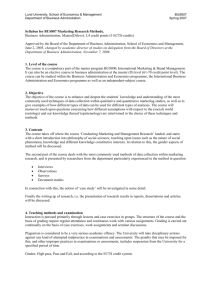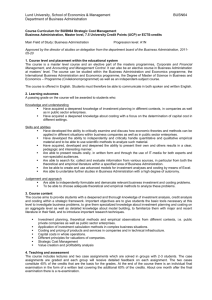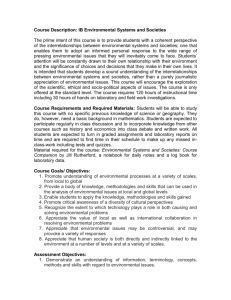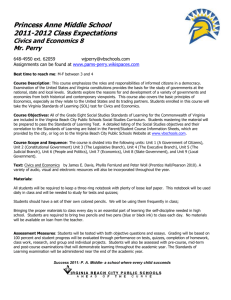Syllabus for
advertisement
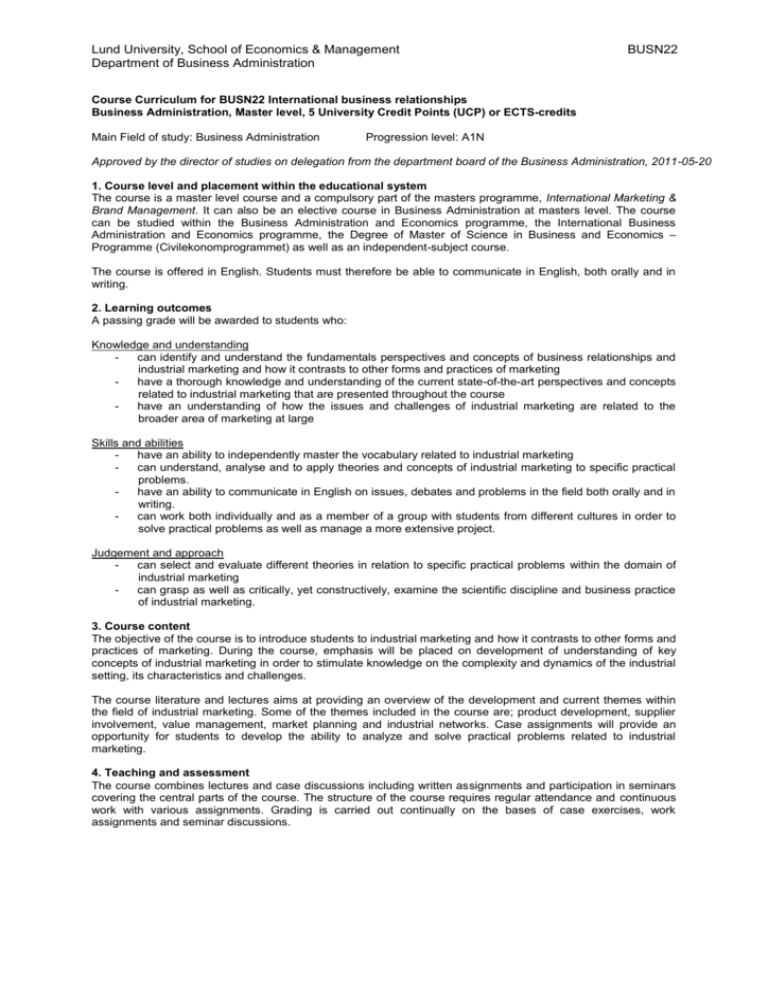
Lund University, School of Economics & Management Department of Business Administration BUSN22 Course Curriculum for BUSN22 International business relationships Business Administration, Master level, 5 University Credit Points (UCP) or ECTS-credits Main Field of study: Business Administration Progression level: A1N Approved by the director of studies on delegation from the department board of the Business Administration, 2011-05-20 1. Course level and placement within the educational system The course is a master level course and a compulsory part of the masters programme, International Marketing & Brand Management. It can also be an elective course in Business Administration at masters level. The course can be studied within the Business Administration and Economics programme, the International Business Administration and Economics programme, the Degree of Master of Science in Business and Economics – Programme (Civilekonomprogrammet) as well as an independent-subject course. The course is offered in English. Students must therefore be able to communicate in English, both orally and in writing. 2. Learning outcomes A passing grade will be awarded to students who: Knowledge and understanding can identify and understand the fundamentals perspectives and concepts of business relationships and industrial marketing and how it contrasts to other forms and practices of marketing have a thorough knowledge and understanding of the current state-of-the-art perspectives and concepts related to industrial marketing that are presented throughout the course have an understanding of how the issues and challenges of industrial marketing are related to the broader area of marketing at large Skills and abilities have an ability to independently master the vocabulary related to industrial marketing can understand, analyse and to apply theories and concepts of industrial marketing to specific practical problems. have an ability to communicate in English on issues, debates and problems in the field both orally and in writing. can work both individually and as a member of a group with students from different cultures in order to solve practical problems as well as manage a more extensive project. Judgement and approach can select and evaluate different theories in relation to specific practical problems within the domain of industrial marketing can grasp as well as critically, yet constructively, examine the scientific discipline and business practice of industrial marketing. 3. Course content The objective of the course is to introduce students to industrial marketing and how it contrasts to other forms and practices of marketing. During the course, emphasis will be placed on development of understanding of key concepts of industrial marketing in order to stimulate knowledge on the complexity and dynamics of the industrial setting, its characteristics and challenges. The course literature and lectures aims at providing an overview of the development and current themes within the field of industrial marketing. Some of the themes included in the course are; product development, supplier involvement, value management, market planning and industrial networks. Case assignments will provide an opportunity for students to develop the ability to analyze and solve practical problems related to industrial marketing. 4. Teaching and assessment The course combines lectures and case discussions including written assignments and participation in seminars covering the central parts of the course. The structure of the course requires regular attendance and continuous work with various assignments. Grading is carried out continually on the bases of case exercises, work assignments and seminar discussions. Lund University, School of Economics & Management Department of Business Administration BUSN22 Grading scale At the School of Economics and Management grades are awarded in accordance with a criterion-based grading scale A-U (A-F). Students have to receive a grade of E or higher in order to pass a course. GRADE CHARACTERISTIC POINTS / PERCENTAGE OF TOTAL SCORE A Excellent 100-85 B Very good 84-75 C Good 74-65 D Satisfactory 64-55 E Sufficient 54-50 U (F) Fail 49-0 CRITERIA A distinguished result that is excellent with regard to the following aspects – theoretical depth, practical relevance, analytical ability and independent thought. A very good result with regard to the above mentioned aspects. The result is of a good standard with regard to the above mentioned aspects and lives up to expectations. The result is of a satisfactory standard with regard to the above mentioned aspects and lives up to expectations. The result satisfies the minimum requirements with regard to the above mentioned aspects, but not more. The result does not meet the minimum requirements with regard to the above mentioned aspects. Plagiarism is considered to be a very serious academic offence. The University will take disciplinary actions against any kind of attempted malpractice in examinations and assessments. The penalty that may be imposed for this, and other improper practices in examinations or assessments, includes suspension from the University for a specific period of time. 5. Prerequisites Students admitted to a Master Programme where this course is either a compulsory or elective part, are qualified for the course. For other students, at least 60 UCP or ECTS-cr in Business Administration is required. These must include a course in basic Business Administration, (e.g., FEK502 Business Administration, General Course, FEKA01 Business Administration: Introductory Course, or FEKC01 Introductory Course in Business Administration, including Business Communication or the equivalent). 6. Miscellaneous The course BUSN22 International Business Relationships cannot be combined with BUSM09 in a degree. 7. Literature See separate literature list. 8. Further information
